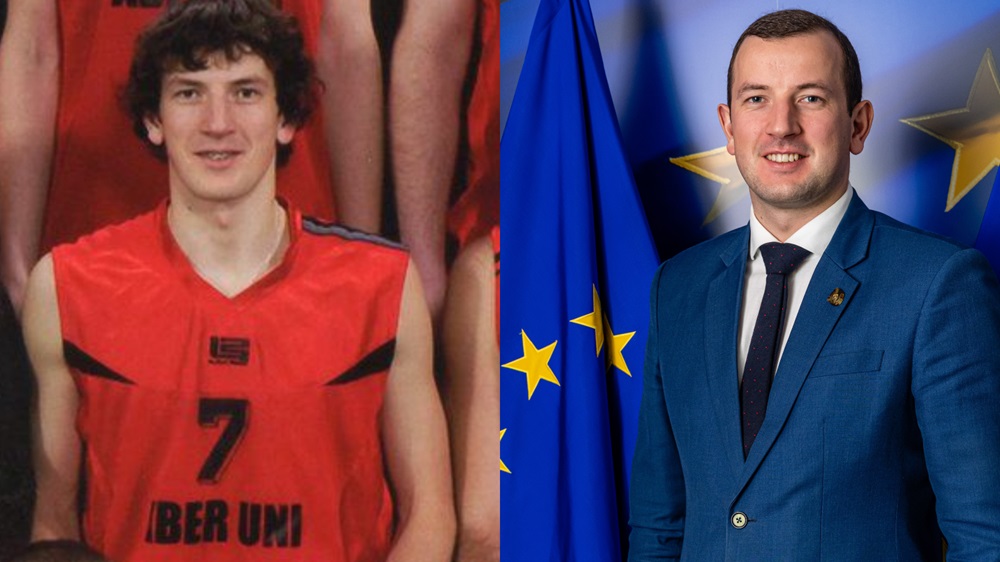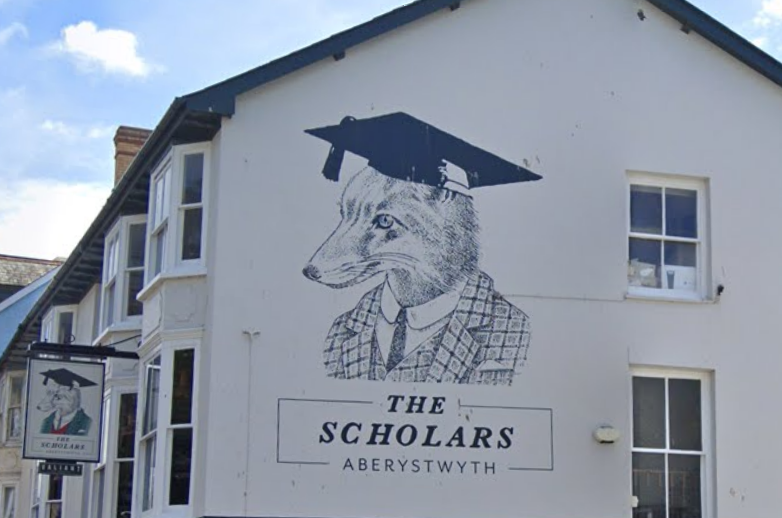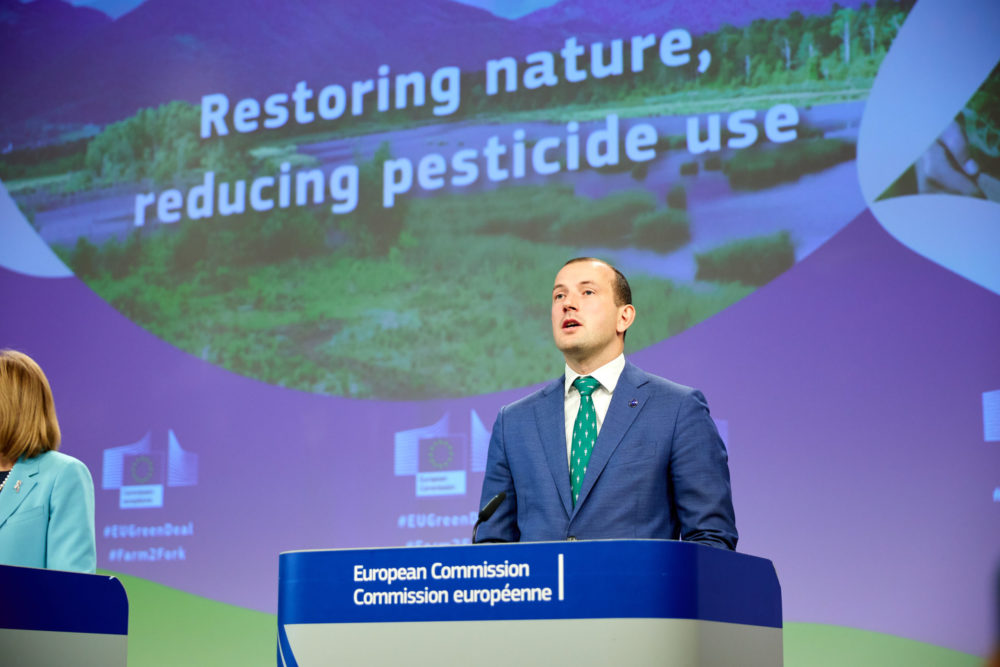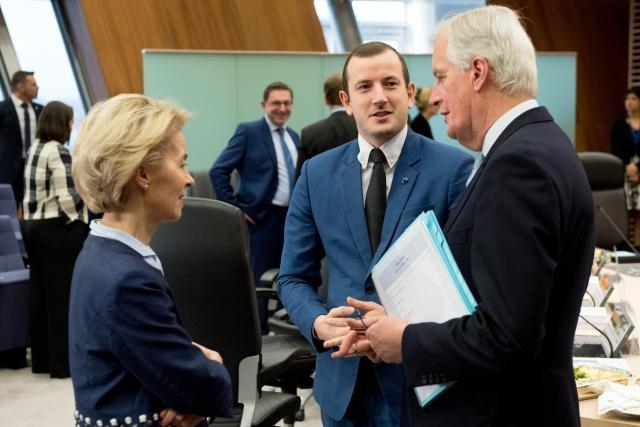From The Scholars to Schuman, the Aber alumnus in Europe’s corridors of power

Luke James, Brussels
For any budding politician interested in transport policy, there’s perhaps no better way to start your education than attempting to get to Aberystwyth by train.
It’s an experience that Virginijus Sinkevičius, the Aberystwyth University alumni who is now a member of the European Parliament’s transport and tourism committee, still remembers well.
After choosing Aberystwyth because of its reputation for teaching international relations, the Lithuanian touched down at Birmingham airport and called his landlord for instructions on how to proceed.
“He had a strong Welsh accent and, at that time, I was just out of school and my English was not so good,” the MEP recalled in an interview with Nation.Cymru this week.
“I didn’t get whether it was two and a half hours or three and half hours by train. I thought it can’t be three and half – it’s the UK and the trains are fast. But then I ended up on the train for three and a half hours, looking at sheep, going through Shrewsbury and Telford.”
The Scholars
After finally arriving at the Welsh coast, Aberystwyth didn’t disappoint. As well as studying for a degree in social sciences and economics, Sinkevičius was a regular at The Scholars pub and brought his home country’s talent for basketball to the university’s team.
“I loved the place,” he said. “It’s little, it’s cosy. For studying and doing sports activities, the infrastructure is great. The weather could be better, but in general it was really good and, at that time, we were always ranking very highly for student satisfaction.”

After completing a dissertation on the struggle for democracy in Belarus and graduating in 2012, Sinkevičius’ star rose more quickly than perhaps any other of Aberystwyth’s notable political alumni, which include a former President of Sierra Leone as well as two former First Ministers of Wales.
Elected to the Lithuanian parliament, the Seimas, as a representative of the Farmers and Greens Union in 2016, he was made minister for the economy just a year later. Then, in 2019 and aged just 28, he became the youngest person ever at that time to become a European Commissioner.
Brexit
Sinkevičius’ arrival in Brussels coincided with the final negotiations over Brexit, which he calls a “very painful moment.”
“I never imagined that it could happen in the UK,” he said. “I was there at the time when unexpectedly the liberals did well in the general election. Plaid Cymru always got their votes. It was life as usual.”
As the commissioner for the environment, oceans and fisheries – a similar portfolio to that held by another Aberystwyth alumni, Joe Borg of Malta, between 2004 and 2010 – he was involved in negotiations over one of the most difficult parts of the deal.
“The final moment of executing Brexit came during my mandate as a commissioner and fisheries was a particularly hot topic on which I spent countless hours negotiating,” he recalled.
“Unfortunately for me, it wasn’t a pleasure at all and I still feel sad about Brexit. I thought about Aberystwyth a lot while working on fisheries.”
UK fish
In fact, he raised his time in Wales more than once in an effort to get a point across during negotiations. “When the politicians get involved and they start defining fish as UK fish or EU fish, that’s absolute nonsense because fish are migratory,” he said.
“When a Lithuanian comes to the UK, he doesn’t suddenly become a UK citizen. But apparently fish which swim through British waters become British. I tried to explain that to Boris Johnson and the chief negotiator a few times but it was very, very difficult.”
The Lithuanian believes that “powers outside Europe won from what happened with Brexit”, but he doesn’t only blame its supporters.
“I think there should have been much more communication from the EU,” he said. “At the beginning, Brexiters were sort of left. There was a decision not to tackle them. That this was a narrative that people won’t believe. Only at the very end did the EU start to communicate.”

Aside from Brexit, Sinkevičius couldn’t have become Europe’s environment commissioner at a better time. He took office at the height of the ‘Fridays for Future’ movement for climate action and the European Green Deal was the flagship policy of the European Commission.
Green
“I remember getting a book when I started,” he explained. “It’s a book where different Commission services chip in with their different ideas for the upcoming five years. They wanted to call everything green: green Europe, green travel, green student exchanges.”
The only real opposition he faced at that time was from his own political family, with one Politico report on his nomination headlined: “Top Green MEP says Commission pick not ‘green’ enough.”
Sinkevičius tried to use the favourable political winds to push forward a Nature Restoration Law which set binding targets for the rewilding of at least 20 % of the EU’s land and sea by 2030.
“You sort of know that you have a window of political opportunity and you can seize the moment for environmental policy and that was the case,” he said. “It became more difficult.”
The law soon ran into opposition from farmers on the continent that would be shared by many of their colleagues in Ceredigion.
Biodiversity
Like the Welsh Government’s sustainable farming scheme, the Nature Restoration Law included a target of using 10% of agricultural land to increase biodiversity by growing hedges or planting trees. And like the Welsh Government scheme, it was later removed.
Sinkevičius is though sympathetic to the concerns of farmers, saying: “Those regulations, they are born in offices, very often being detached from the reality in the farm. There’s a cultural issue. I don’t think farmers are so against the Green Deal itself.”
Instead he saves his ire for what he sees as opportunism of centre-right politicians who opposed the law: “The most difficult part here is that you have people who in 2019 ran elections as extremely green.
“Then in three years, the political momentum shifted and the very same people, especially politicians in the Parliament, were completely on the other side. That was unpleasant to see people change so quickly and bank on voters having a short memory.”
Sinkevičius left the Commission this summer to run for a seat in the European Parliament himself. He is now vice-chair of a reduced Green group in what many believe is the most right-wing parliament in the EU’s history.
Progressive parties, he said, should “study why they cannot find a way into the people’s hearts” and “why people stop believing in rational politicians.”
Split
The Greens were split over whether to support the new European Commission, which has been accused of abandoning the Green Deal. The Lithuanian was among those that voted in favour, insisting: “At this geopolitical moment what we really need is a working commission.”
Asked whether he believes his former boss, Commission President Ursula von der Leyen, when she promises to “stay the course with the Green Deal”, he replied: “I honestly think there is no other choice. The Green Deal is so far ahead.”

The MEP immediately returns to his time in Aberystwyth to illustrate the need to go green.
“I remember very well living in Wales, in those houses that become very, very cold when the temperature drops,” he said.
You need to heat them because they’re not built for winter conditions but most of them have old electric heating and straight away your bill just flies up.”
“So we need better housing, investment in renovation and improved electrification. That would help save people money on energy bills.”
Student digs
Living in a draughty student digs on the windswept Welsh coast during the depths of winter must feel about as far as it’s possible to get from the corridors of power in the European institutions.
But it’s clear that Sinkevičius’ experiences as a student in Wales prepared him well for politics and that, despite a career rise steeper than Penglais Hill, Aber still holds a special place in his heart.
“I have a couple of friends living there who are teaching or with small shops,” he said. “So from time to time I still talk with them and when I have an opportunity I still want to get my family there. Maybe this summer the time will come to take a journey.”
Read more: How Wales’ future generations policy is being used as ‘window dressing’ for a new right-wing European Commission
Support our Nation today
For the price of a cup of coffee a month you can help us create an independent, not-for-profit, national news service for the people of Wales, by the people of Wales.






Interesting article. Our country is greatly enhanced by quality foreign students and workers, but unfortunately politics is a different matter. I believe the recent no-confidence Michel Barnier was heavily involved in the EU that the UK decided to leave, forced through by Alexander Boris Johnson, the son of Brussels bureaucrat, who characteristically decided his short term career was more important than the long term interests of anyone and anything else. As for Aber alumni, I’m sure one of them managed to get overly high in our national politics recently, until the £200k government money cashback from a toxic criminal to… Read more »
…and another “colourful” character, Neil Hamilton, graced its politics dept way back in late 60’s-early 70’s. Bob Stewart, who put in a court appearance a few days ago was also there. Proper rogues gallery.